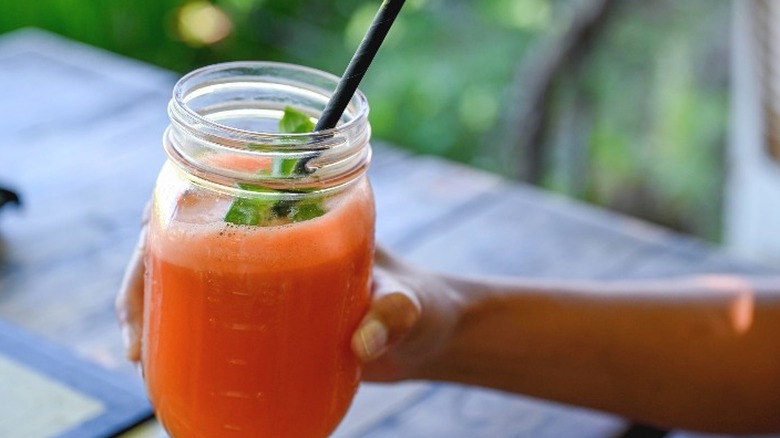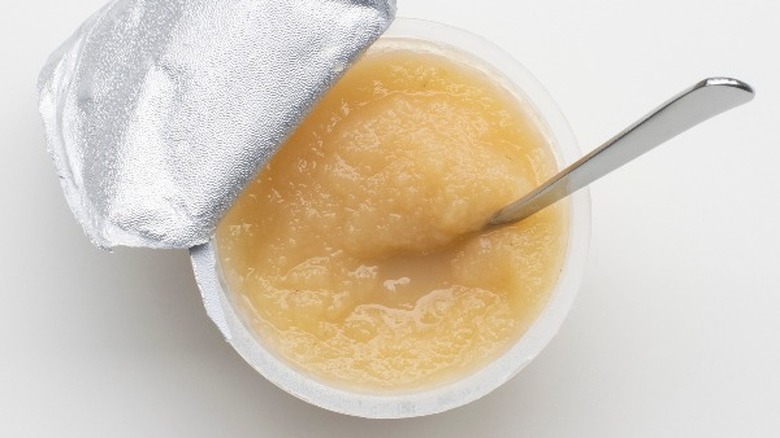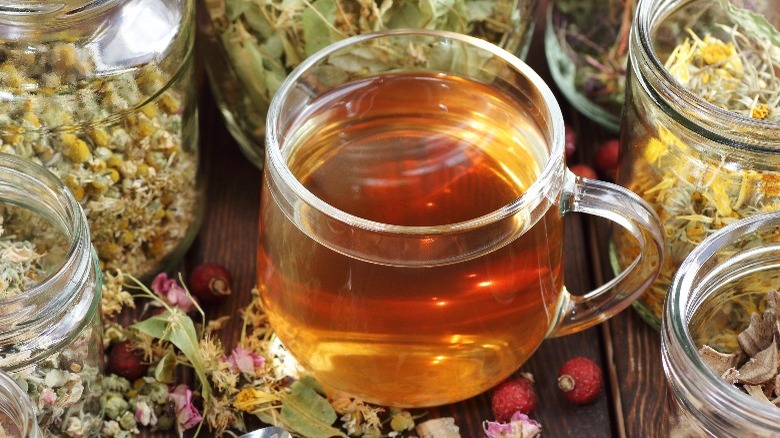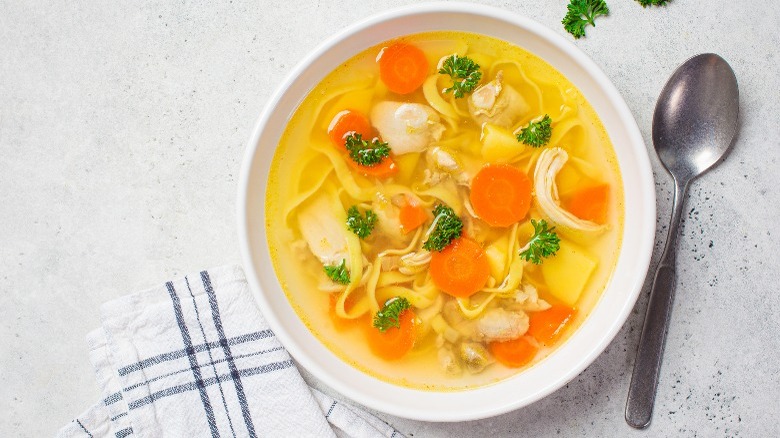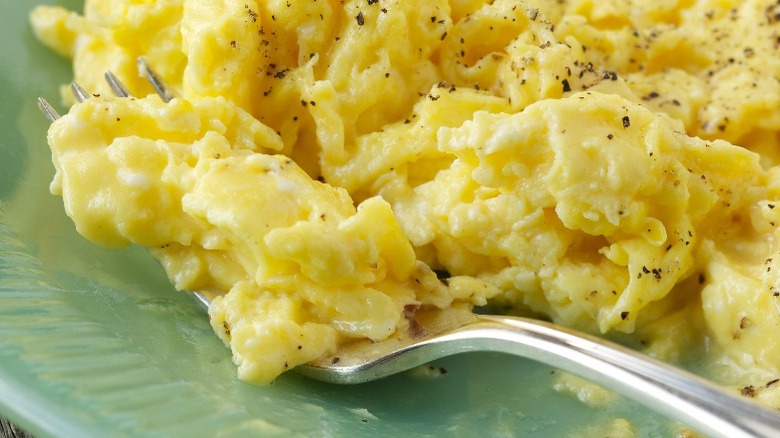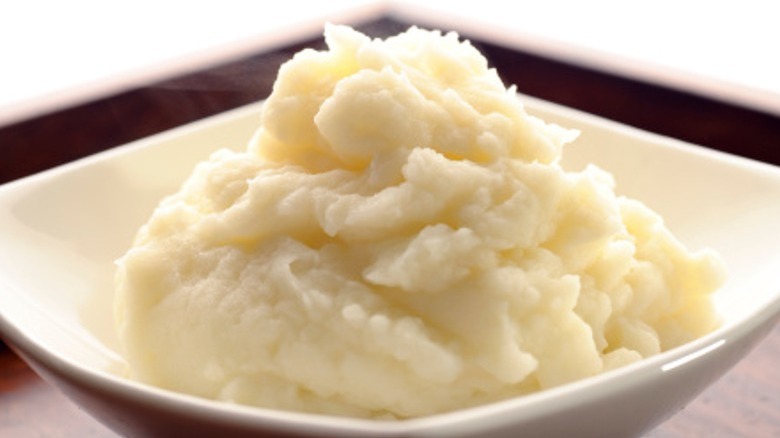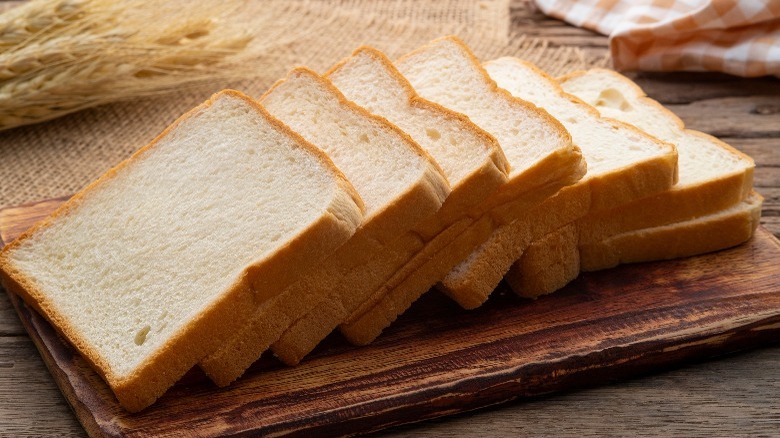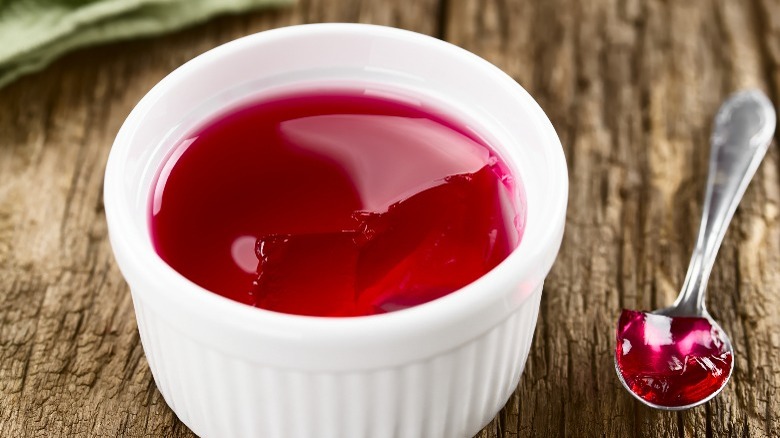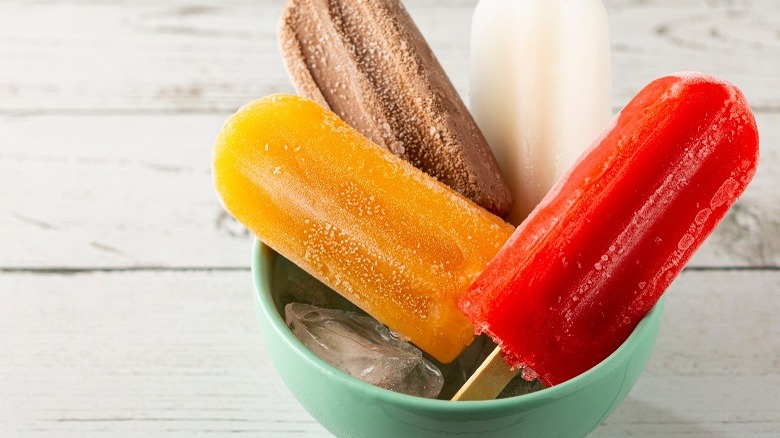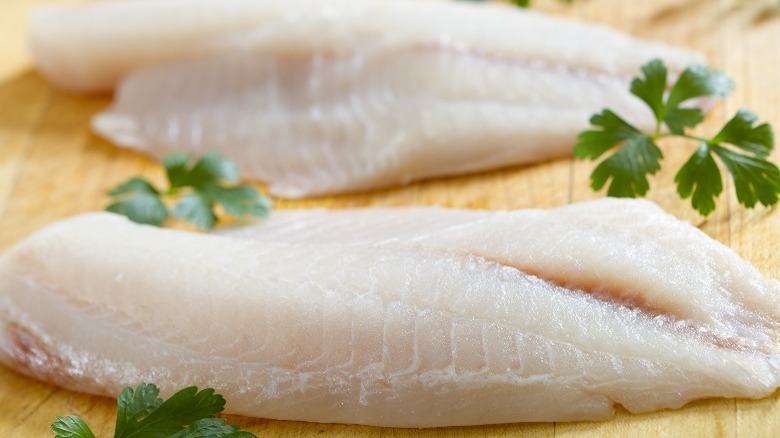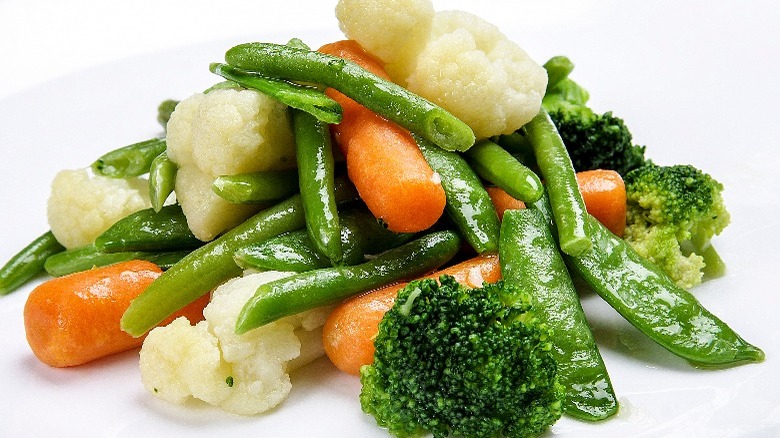Here's What Foods You Should Be Eating After A Colonoscopy
According to the American Cancer Society, colorectal cancer is the third most common type of cancer in the United States. Colorectal cancer includes colon and rectal cancers, which affect both men and women. While colorectal cancer is a common diagnosis, death rates from the disease have declined over the past decades. This drop in mortality rates from colorectal cancer is likely due to better screening practices and catching signs earlier when the cancer is easier to treat.
A colonoscopy is a type of exam that checks for signs of colorectal cancer, including polyps, swollen tissue, or irritation in the colon and rectum. As explained by Mayo Clinic, these screenings are recommended for people over 45 who have a risk of developing colon cancer and those experiencing abdominal pain and ongoing intestinal problems. The procedure involves a flexible scope with a tiny camera that is inserted into the rectum and used to view the colon from the inside.
Because a colonoscopy requires the scope to enter the large intestine and run the full length of the colon for a thorough screening, the doctor will typically pump your colon with air to get the best view. After the procedure, you'll need to follow a diet that is easy on your digestive system and allows the intestines to recover. Here are some recommendations that can help you feel back to normal after a colonoscopy.
Water
Preparation for a colonoscopy is a strict process that's designed to get the colon ready for the exam. As shared by the American College of Surgeons, patients must stop eating solid foods to allow the intestines to empty and give their doctor the best view of the colon's lining during the procedure. In some cases, your doctor will also give you oral laxatives to help clear the bowels of all solid waste. While this is essential for your colonoscopy, it can also leave you dehydrated.
The first thing most doctors recommend for patients to consume after a colonoscopy is water. Dr. Juan Echavarria, Professor of Medicine in the Department of Gastroenterology at the University of Texas Health Science Center, shares in an interview with You and Colonoscopy that patients should drink one to two liters of water after the colonoscopy to rehydrate the body. That is about a quarter to half a gallon of water, as soon as the patient is awake and able to keep fluids down.
Drinks with electrolytes
In addition to water, colonoscopy patients should reach for hydrating drinks that contain essential electrolytes like sodium, magnesium, phosphate, and potassium. Electrolytes are substances that can carry an electrical charge when dissolved in water (per Cleveland Clinic). These electrical charges are crucial for muscle contractions that allow the body to move and stay balanced.
A review published in the European Journal of Case Reports in Internal Medicine explains that doctors often use a special solution that contains a mixture of sodium picosulfate, magnesium oxide, and citric acid to cleanse the bowels prior to a colonoscopy. Unfortunately, these bowel preparations before the procedure can lead to an imbalance of electrolytes. After your colonoscopy, your doctor may recommend sports drinks, Pedialyte, or other beverages that contain electrolytes to hydrate the body and help with bodily functions.
Different electrolyte imbalances can cause a myriad of symptoms that range from mild to life-threatening, including dry mouth, restlessness, confusion, muscle weakness, irregular heart rate, blood pressure changes, and difficulty breathing (per Healthline). If you experience any of these symptoms after a colonoscopy, talk to your doctor right away.
Vegetable juice
Because you have to refrain from eating solid foods before a colonoscopy, you'll likely feel hungry after the procedure. However, you might not be ready to jump right into eating your normal diet immediately. Your doctor will advise you to stick to foods that are easy to digest and won't irritate the digestive system.
Vegetable juice is a great choice to ease you back into your regular eating routine. Not only is vegetable juice hydrating, but it's also packed with nutrition, electrolytes, and antioxidants your body needs to bounce back after a colonoscopy. Depending on what type of vegetable juice you drink, you'll also feel fuller than you would by simply drinking water or other beverages.
According to Medical News Today, the popular V8 vegetable juice contains a mixture of tomato puree and carrot, celery, beet, parsley, spinach, and lettuce juices. It's rich in vitamins A and C and other essential nutrients. While V8 is widely available, you can also choose to juice your own vegetables at home. Just be sure to pick vegetables that are easy on your stomach, or ask your doctor for recommendations.
Applesauce
Applesauce is another food to consider after a colonoscopy. Because it's soft and easily digestible, it makes sense to add this to your post-procedure diet. Additionally, applesauce is a good source of polyphenols, which are antioxidants that prevent or reverse cell damage and support several bodily systems.
A review published in Current Pharmaceutical Biotechnology shares how polyphenols can help with bowel inflammation and gastrointestinal diseases. Apple polyphenols, in particular, increase antioxidant enzymes in colon cells and decrease the amount of inflammation-causing agents in the gut. Some animal studies included in the review showed how apple polyphenols protected against colonic damage and inflammatory responses by suppressing cytokines and T-cell receptors. Overall, the antioxidants found in apples and applesauce can promote gut health by reducing inflammation in the bowel.
On top of the digestive benefits of applesauce, many store-bought brands have added ascorbic acid to preserve the applesauce. As shared by WebMD, ascorbic acid can strengthen the immune system and support the body's natural healing process. After a colonoscopy, these health-boosting properties may help you feel better faster and ready to get back to your normal routine.
Herbal tea
Bloating and an unsettled digestive tract are common side effects many patients deal with after a colonoscopy. During the procedure, the colon is pumped with air to improve visibility as the scope makes its way through the bowel. This extra air and pressure can result in feeling bloated and generally uncomfortable as the body recovers.
One way to counter these colonoscopy effects is to drink herbal teas after the exam. Herbal teas are made from various plant leaves, roots, or flowers that do not come from the tea plant known as Camellia sinensis. They are naturally caffeine-free and typically contain ingredients that support your health and overall well-being. For example, peppermint tea is often used to promote healthy digestion, while ginger tea has long been used to relieve nausea.
For bloating and upset stomach after a colonoscopy, try sipping on a hot cup of chamomile tea. According to a review found in Molecular Medicine Reports, chamomile can relax the digestive tract by helping with flatulence, indigestion, nausea, and diarrhea. One study included in the review found that chamomile was particularly effective at dispelling gas and aiding in healthy digestion by relaxing the intestinal muscles. Additionally, drinking herbal tea will help with dehydration after the procedure.
Soup
As you recover from your colonoscopy exam, sticking to light meals that are easy to digest is important. Soups are a good transition food if you're not yet ready to eat a full meal but want to have something a little more hearty than juice or clear liquids. Just remember to keep it simple and steer clear of spicy or greasy soups and those that could make you gassy. Soups made with cruciferous vegetables, beans, or cream-based broths may not be the best choice right away.
Instead, choose a healthy broth-based soup that will give you a good amount of nutrition while not upsetting your stomach, such as chicken noodle soup or miso soup. Chicken noodle soup offers a good balance of protein, fiber, fats, carbohydrates, and other nutrients like iron and potassium (via Nutritionix). According to WebMD, miso soup is rich in nutrients that offer health benefits that can improve digestion and reduce the risk of developing heart disease and some types of cancer.
If you're unsure which soup is appropriate for you after a colonoscopy, you can always ask your gastroenterologist or other healthcare provider for tips or recommendations. They may even suggest some recipes you can make at home that will have you feeling better in no time.
Scrambled eggs
Following your colonoscopy, your doctor may include scrambled eggs on your list of foods to eat after the procedure. Scrambled eggs are generally soft and easy to digest, making them an ideal choice when recovering from a colonoscopy exam. However, be sure to avoid adding anything to your eggs that could upset your digestive tract. Skip the cheese, milk, or greasy ingredients and stick to basic scrambled eggs until you feel like you can tolerate a heavier meal.
Scrambled eggs are a good source of protein, vitamin D, and other vitamins and minerals that carry health benefits (via Nutritionix). In particular, the protein found in eggs can aid in healing by repairing and maintaining tissues in the body. If you had a biopsy or polypectomy during your colonoscopy, it could take a little more time and patience to heal fully.
Getting a good amount of protein can support a quick recovery after a colonoscopy. Registered dietician Kavitha Krishnan told Cleveland Clinic, "Inadequate protein intake will impair collagen formation and slow down the wound healing process." Scrambled eggs provide a healthy amount of protein without upsetting the sensitive intestinal lining in most patients.
Mashed potatoes
Another soft food that won't put too much digestive strain on your colon is mashed potatoes. Although mashed potatoes are typically made with a good amount of butter, milk, or cream, try to keep them as simple as possible if you've just had a colonoscopy. You don't want to add too much dairy to your potatoes and risk irritating your digestive tract.
Potatoes are a good choice because they offer some nutritional value that can help you get your digestive system back on track. According to Healthline, potatoes are rich in potassium, vitamin B6, vitamin C, and other important vitamins and minerals. Potassium is a crucial electrolyte that may have been thrown off balance during your colonoscopy preparation, as explained in a review published in the European Journal of Case Reports in Internal Medicine. Eating basic mashed potatoes could replenish this essential electrolyte as you recover.
In addition, vitamin B6 found in potatoes helps the body digest and process protein (via Gastroenterology Healthcare Associates), which can support the healing process. According to an article in Future Microbiology, vitamin C can aid digestion by boosting levels of healthy bacteria in the gut. With these benefits combined, it's worth asking your doctor if mashed potatoes are a good dietary option for you after a colonoscopy.
White bread
If you're looking for something plain and simple that won't irritate your sensitive gut after a colonoscopy, white bread or toast is usually a favorite. The starch and carbohydrates in white bread are easy to digest and may help if you're feeling nauseous by absorbing excess acid. Also, white bread doesn't have a strong smell or flavor, which can trigger nausea or upset stomach.
While whole-wheat bread is often touted as the superior choice to white bread, you may be better off with white bread when you're recovering from a colonoscopy exam. According to WebMD, the dense fiber found in whole grains can be a little harsh on the gut if you're struggling with digestive issues. In fact, many people who suffer from irritable bowel syndrome (IBS) typically stay away from whole wheat. A study published in the Journal of Agricultural and Food Chemistry found that white bread actually helped promote the growth of a healthy bacteria in the gut called Lactobacillus.
When preparing toast after a colonoscopy, remember to stay away from toppings or spreads at first. Just a plain piece of toasted white bread may be the best place to start if you're easing your way into heavier foods.
Jello
Jello is a type of dessert made with gelatin that has been a popular American staple for several decades. According to Healthline, the gelatin used to make jello comes from collagen protein, which is the main building block of ligaments, tendons, bones, skin, and other connective tissues in animals. While jello doesn't offer a ton of nutrients, it still may be beneficial in some ways if you've just had a colonoscopy.
As explained by WebMD, the collagen in gelatin can promote healthy digestion by building the protective mucus that lines the walls of the intestines. A study in animals published in Pathophysiology confirmed that gelatin helped in the development of a thick intestinal lining that protects against ulcers and other types of gut damage. Another study found in Clinics shares that gelatin is rich in glutamic acid, which the body uses as glutamine to line the stomach and support digestion.
Additionally, gelatin contains some antioxidants, amino acids, and electrolytes that can help your body get back in balance after a colonoscopy, including calcium, magnesium, choline, and sodium. Check with your gastroenterologist to see if jello is safe for you to eat and if they recommend certain brands or flavors.
Popsicles
If you're feeling queasy or your digestive system is not quite back to normal yet, popsicles may be helpful. Because it's so important to rehydrate after a colonoscopy exam, doctors often recommend that patients consume water as soon as they recover from anesthesia and can tolerate liquids. However, it may take some patients longer to be able to drink water or other liquids that will help them recover. According to an article in Gastroenterology, as many as one-third of colonoscopy patients experience nausea and abdominal discomfort that can last up to several days after the procedure.
However, one thing that patients typically tolerate well after a medical procedure is popsicles. An article published in the British Journal of Anaesthesia found that ice popsicles given to patients after surgery noticeably reduced postoperative nausea and vomiting. Also, sucking on a popsicle after your exam may be a good way to rehydrate and get some sugar that can help boost energy levels after not eating for a while.
Whitefish
Cooked whitefish, including tilapia, cod, flounder, or halibut, are good choices when you want to reintroduce protein to your diet after a colonoscopy. Whitefish is soft, mild in taste, and easy on the digestive tract if you keep the preparation simple. It's also packed with essential nutrients that can promote overall health and aid in your recovery. Although there may be slight variations depending on the fish you choose, you'll get a good amount of lean protein, healthy fats, and potassium when you eat whitefish (via Nutritionix).
If you think you're ready to step up your food consumption, try steaming, baking, or sauteing the fish, and ensure it's cooked through and flaky before eating. Stay away from heavy sauces or seasonings that could potentially be harsh on your stomach. You can also pair the fish with simple white rice or soft steamed vegetables to round out your meal. Ask your healthcare providers when you might be ready for whitefish and other foods that can help you get your digestion back on track.
Tender cooked vegetables
After a few days following your colonoscopy, cooked vegetables that are soft and tender are a healthy food choice your doctor may suggest. Getting the right amount of nutrition is vital to your digestive health and returning to your normal routine. Steamed or sauteed vegetables are easy enough on the stomach while offering essential vitamins, antioxidants, and other nutrients your body needs to recover.
A good mix of steamed vegetables is an excellent source of fiber, vitamins C and A, folate, potassium, and more (via MyFitnessPal). However, you may want to go easy with cruciferous veggies like broccoli, cauliflower, or Brussels sprouts in the beginning. These types of vegetables can potentially make you gassy or bloated, which is the last thing you want after a colonoscopy. Instead, ease into the vegetables with digestible carrots, green beans, or pumpkin (via Healthline).
Also, keep in mind that cooking the vegetables thoroughly will break down some of the fiber that could be harsh on the stomach after a colonoscopy. While you typically want to preserve as much fiber and nutrients in your vegetables during the cooking process, removing some of the hard-to-digest fiber may be beneficial when your gut is still sensitive.



